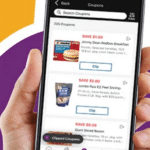
As the debate over digital coupon discrimination has heated up, various solutions have been proposed – in-store digital coupon kiosks, assistance from customer service representatives, expanding internet access to the digitally-disconnected.
But some are proposing a seemingly simpler solution – just give away coupon discounts to everyone, whether they clip them, or ask for them, or not.
New Jersey was the first state to consider mandating expanded access to digital coupons last year, debating a bill that ultimately did not pass. Lawmakers in three other states – New York, Illinois and, just this month, Rhode Island – have since proposed legislation identical to New Jersey’s original proposal.
But lawmakers in Massachusetts and Washington state have gone much further. Instead of requiring stores offering digital coupons to also make available an “in-store alternative of identical value,” as New Jersey’s measure did, they’re proposing that all digital coupons be applied automatically to shoppers’ purchases.
Both of those bills were discussed in public hearings this week. In Massachusetts, Democratic state representative Jeffrey Rosario Turco advocated for his bill, which would require grocery stores offering digital coupons to apply them automatically to senior citizens’ purchases, and to any other loyalty program members simply upon request.
“Any store offering digital coupons… shall be required to apply said digital coupons to the purchases of any buyer 65 years old or older upon the presentation of a government issued photo identification,” the bill reads. Furthermore, “upon presenting a store card, a consumer may ask a store cashier or a customer service representative if the store offers digital coupons. If the store does offer digital coupons, the store shall apply all available digital coupons to the consumer’s purchase.”
In explaining his bill Monday to the state legislature’s Joint Committee on Consumer Protection and Professional Licensure, Turco said his main goal was to make sure senior citizens don’t get left behind. “A senior that still operates on a flip phone as opposed to a smartphone, doesn’t have the ability to sign up and register for the various programs,” he said, “and as a result they may not get access to coupons that everyone else with a smartphone would.” So in his proposed solution, “a senior citizen should be able to present evidence of their age and then whatever coupons are in the digital queue should automatically be put forward for them.”
He did not address the other part of his bill, which would similarly “automatically put forward” digital coupons for any loyalty card holder who simply asks if the store offers digital coupons.
On Tuesday, meanwhile, Washington state lawmakers considered a bill that’s even broader. “Protecting a consumer’s right to coupon and sale prices offered by grocery stores” is the title of the proposal introduced by Democratic state Senator Steve Conway. “At the time of purchase,” it reads, “a grocery establishment must credit any coupons or charge the reduced sales prices that are posted in the store or offered through electronic mediums even if the consumer has not signed up for the electronic medium.”
In other words, you don’t have to be a loyalty program member, you don’t have to browse or clip any digital coupons, you just show up at the store, buy your groceries, and if there happen to be any digital coupons available for what you bought, you’ll be given the discounts automatically.
“Seniors and other people, poor people, who are not able to go online cannot access these discounts,” Conway told a meeting of the Senate Committee on Labor and Commerce. “This is a simple issue of fairness,” he said. If stores “are going to require you to go online to get these discounts, I think that’s discriminatory.”
He, too, did not address the particular phrasing of his bill, which as written would apply to everyone and not just seniors.
Nevertheless, he got some pushback from retail industry representatives who testified before the committee. Digital coupons are only one of a “variety of programs” that stores offer to help their customers save, Northwest Grocery Association representative Brandon Houskeeper said. “We just can’t support something that mandates how we particularly apply these marketing opportunities across all mediums.”
“A lot of times coupons are from the manufacturer,” Washington Food Industry Association representative Katie Beeson added. So in order for a retailer to be properly reimbursed, a digital coupon must be clipped and linked to a customer’s account, “versus just honoring it at the register per the customer’s request,” she said. “I’m not sure if that component was thought through when bringing this forward.”
Besides, Houskeeper said, “when we hear of these one-off problems, where somebody comes to us and says I don’t have access, we work with that individual consumer to address and remedy the issue.” Just “bring it to the store’s attention that you don’t have access to that particular medium but you’re aware of the discount, (and) they’ll honor those discounts.”
“I’m not certain that’s the case,” Conway retorted. “In the store that I’ve been in, I don’t see any placards or anything there at the checkstand that tells people that they can access these if you’ll just talk to us. That is not there.”
The two bills are the latest example of how the debate over digital discrimination has morphed over the past year and a half, from honoring advertised sale prices that are only available digitally, to automatically applying all digital manufacturer’s coupons to all shoppers’ purchases. When Consumer World founder Edgar Dworsky first called attention to the digital divide back in June 2022, he focused on stores’ printed weekly circulars that prominently advertise low prices that are only available if you first go online to “activate” the deal, loading it to your loyalty account. “They are a clever ploy by big supermarket chains to get people into the store knowing full well that some of them will wind up paying more than the advertised price,” Dworsky said at the time. He called on stores to offer a way for the digitally-disconnected to activate these advertised deals in-store if they didn’t have a way to do it at home.
Once state lawmakers jumped on the issue, though, they began to equate “digital deals” with “digital coupons,” with their proposed solutions morphing from equality of access to equality of outcome. When critics of New Jersey’s bill testified last month that coupons “are not meant to set a universal price for a product,” and granting them to everyone would likely result in lower coupon values overall, the bill’s sponsor shrugged it off. “That’s what happens when you make it democratic and you give it to everyone,” he said.
Both the Massachusetts and Washington bills are subject to further debate and discussion, before potentially coming up for a full vote later in their respective legislative sessions. And both are subject to possible revisions. Just as New Jersey’s original bill that initially mandated “a paper coupon of identical value” was revised to an “in-store alternative” to digital coupons, the Massachusetts and Washington bills may be narrowed down so as not to apply to all shoppers who do have digital access, but just don’t feel like clipping digital coupons.
Or, the bills may not be revised, they could pass and could end up becoming law as-is. Digital coupons that you don’t have to clip, and discounts that you get automatically, may appeal to many shoppers. But it’s roughly the equivalent of every cashier having a stack of neatly-clipped newspaper insert coupons, and scanning all the ones that happen to apply to purchases you’ve made. What shopper wouldn’t like that?
Those who issue coupons would argue that’s not how coupons are meant to work – they’re supposed to incentivize you to buy a product, not to reward you for buying something you would have bought anyway even without a discount. And if brands can’t count on coupons to incentivize purchases, they may quit offering coupons at all and just make everyone pay full price.
With more and more lawmakers looking into the issue, Conway acknowledged that his bill isn’t unique. “Several states have been looking at this. This is not just Steve Conway,” he told his colleagues. “There are other states who’ve been introducing legislation around this area, so let’s see if we can get a result.”
And the more states that consider similar legislation, the more uncertain the “result” might be. So as more lawmakers get involved without necessarily fully appreciating how coupons work, if you’ve ever wished that couponing could be effortless – you might want to be careful what you wish for.
Image source: Hy-Vee











I do not have a smart phone and/or a computer – I am elderly and on a fixed income and I cannot get the discount that a digital coupon offers. This is WRONG. I am at the library using their computer right now. What a discriminatory fiasco – Not right. I refuse to shop at at stores that will not give me the digital discount